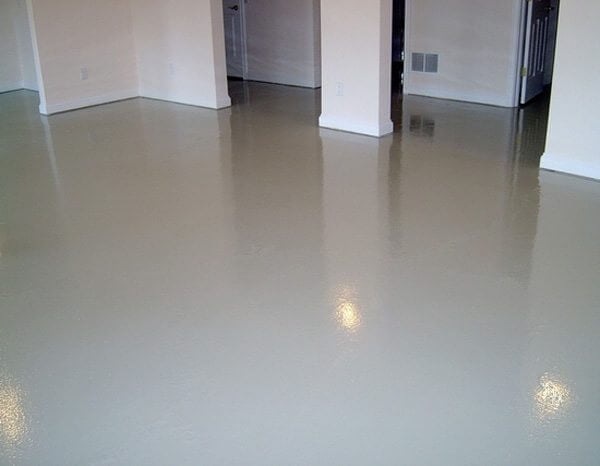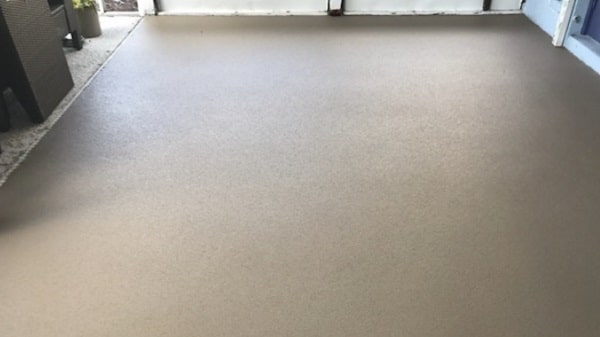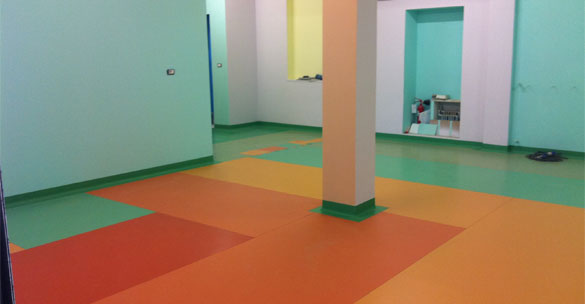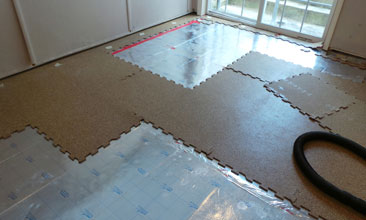Garage Floor Rubber Coating: Enhancing Durability and Safety
Garage floor rubber coating offers a practical solution for homeowners looking to enhance the durability and safety of their garage floors. Unlike traditional concrete or epoxy coatings, rubber coatings provide a flexible and resilient surface that can withstand heavy use and resist damage from impacts, chemicals, and moisture. In addition to improving durability, rubber coatings also enhance safety by providing a slip-resistant surface that reduces the risk of slips, falls, and accidents in the garage. Let’s see how garage floor rubber coating can enhance durability and safety in your garage.
- Impact Resistance: One of the primary benefits of garage floor rubber coating is its exceptional impact resistance. The flexible nature of rubber allows it to absorb the force of impacts from dropped tools, equipment, and vehicles, preventing damage to the underlying concrete substrate. This helps prolong the lifespan of the garage floor and reduces the need for costly repairs or replacements due to cracks, chips, or dents.
- Chemical Resistance: Rubber coatings are highly resistant to a wide range of chemicals commonly found in garages, including motor oil, gasoline, brake fluid, and household cleaners. This chemical resistance protects the garage floor from staining, discoloration, and deterioration caused by exposure to harsh chemicals, ensuring that the floor remains in pristine condition for years to come.
- Moisture Protection: Garage floor rubber coating creates a waterproof barrier that helps prevent moisture from penetrating the concrete substrate. This is particularly important in areas with high humidity or frequent exposure to water, such as during rainy weather or when washing vehicles. By sealing the garage floor with a rubber coating, homeowners can protect against water damage, mold growth, and concrete deterioration caused by moisture infiltration.
- Slip Resistance: Safety is a top priority in any garage, and rubber coatings provide an excellent solution for enhancing traction and reducing the risk of slips and falls. The textured surface of rubber coatings creates friction underfoot, even when wet, helping to prevent accidents in the garage. This is especially important in areas where spills or moisture accumulation are common, such as near entryways or vehicle maintenance areas.
- Sound Dampening: In addition to improving durability and safety, garage floor rubber coating also offers sound-dampening properties that help reduce noise and vibrations in the garage. This is particularly beneficial for homeowners who use their garage as a workshop, gym, or recreational space, as it creates a quieter and more comfortable environment for various activities.
- Easy Installation: Garage floor rubber coating is relatively easy to install compared to other flooring options, making it a popular choice for DIY enthusiasts. Depending on the product, rubber coatings can be applied using a roller, brush, or spray, and typically require minimal surface preparation. With proper preparation and application techniques, homeowners can achieve professional-looking results without the need for specialized tools or equipment.

Advantages of Using Rubber Coating for Garage Floors
Rubber coating has become increasingly popular as a flooring option for garage floors, offering numerous advantages over traditional materials like concrete or epoxy. From durability to customization options, rubber coating provides homeowners with a versatile and practical solution for protecting and enhancing their garage floors. Let’s discuss some of the key advantages of using rubber coating for garage floors.
Durability: One of the primary advantages of rubber coating for garage floors is its exceptional durability. Rubber is a resilient material that can withstand heavy use, impacts, and abrasion, making it ideal for high-traffic areas like garages. Unlike concrete or epoxy coatings, which can chip, crack, or peel over time, rubber coatings provide a flexible and long-lasting surface that remains in excellent condition even under harsh conditions.
Impact Resistance: Garage floors are subject to a lot of wear and tear from vehicles, tools, and equipment, making impact resistance a crucial consideration. Rubber coating offers superior impact resistance compared to other flooring materials, thanks to its flexible and shock-absorbing properties. This helps protect the underlying concrete substrate from damage and extends the lifespan of the garage floor.
Chemical Resistance: Another significant advantage of rubber coating for garage floors is its resistance to chemicals commonly found in garages, such as motor oil, gasoline, and household cleaners. Rubber coatings create a protective barrier that prevents these chemicals from penetrating the concrete substrate, reducing the risk of staining, discoloration, and deterioration. This makes rubber coating an excellent choice for homeowners who store vehicles or perform maintenance tasks in their garages.
Slip Resistance: Safety is paramount in any garage, and rubber coating provides an effective solution for enhancing traction and reducing the risk of slips and falls. The textured surface of rubber coatings creates friction underfoot, even when wet, helping to prevent accidents in the garage. This is particularly important in areas where spills or moisture accumulation are common, such as near entryways or vehicle maintenance areas.
Customization Options: Rubber coating for garage floors comes in a variety of colors, patterns, and textures, allowing homeowners to customize the look of their garage to suit their personal preferences and style. Whether you prefer a sleek, modern finish or a more textured, industrial look, there’s a rubber coating option to match your aesthetic vision. Some manufacturers even offer customizable options, allowing homeowners to create unique designs or incorporate logos and graphics into their garage floor.
Easy Maintenance: Maintaining a rubber-coated garage floor is relatively easy, requiring minimal effort and expense. Rubber coatings are resistant to stains, spills, and abrasion, making them easy to clean with just soap and water or a mild detergent. Unlike concrete or epoxy floors, which may require periodic resealing or refinishing, rubber-coated floors retain their appearance and functionality with minimal maintenance.
Application Techniques and Considerations for Garage Floor Rubber Coating
Applying rubber coating to garage floors is a straightforward process that requires careful preparation and attention to detail to ensure optimal results. From surface preparation to product selection and application techniques, there are several factors to consider when coating garage floors with rubber. Below are some application techniques and considerations for garage floor rubber coating.
Surface Preparation: Proper surface preparation is essential for ensuring adhesion and durability when applying rubber coating to garage floors. Start by thoroughly cleaning the concrete substrate to remove dirt, grease, oil, and other contaminants using a degreaser or concrete cleaner. Use a pressure washer or scrub brush to remove stubborn stains and ensure a clean, smooth surface for coating.
Repairing Cracks and Imperfections: Before applying rubber coating, inspect the garage floor for cracks, chips, or other imperfections and repair them as needed. Use a concrete patching compound or epoxy filler to fill in any cracks or holes in the concrete substrate, and smooth out the surface with a trowel or putty knife. Allow the repairs to dry completely before proceeding with the coating application.
Choosing the Right Product: Selecting the right rubber coating product is crucial for achieving the desired results and ensuring long-lasting performance. Consider factors such as the type of rubber coating (e.g., roll-on, spray-on), the color and finish options, and the manufacturer’s recommendations for application and coverage. Choose a high-quality rubber coating specifically designed for garage floors to ensure compatibility and durability.
Applying the Coating: Once the surface is clean, dry, and free from imperfections, it’s time to apply the rubber coating to the garage floor. Follow the manufacturer’s instructions carefully, mixing the coating product according to the specified ratios and applying it evenly to the surface using a roller, brush, or spray equipment. Work in small sections to ensure thorough coverage and avoid overlapping or puddling of the coating.
Allowing Sufficient Drying Time: After applying the rubber coating, allow sufficient drying time as per the manufacturer’s recommendations before walking on or placing heavy objects on the garage floor. Proper drying and curing are essential for achieving optimal adhesion and durability of the coating. Avoid subjecting the freshly coated surface to foot traffic or vehicle traffic until the coating is fully cured to prevent damage or imperfections.
Adding Texture or Non-Slip Additives: Depending on your preferences and safety requirements, you may choose to add texture or non-slip additives to the rubber coating to enhance traction and reduce the risk of slips and falls. Many rubber coating products offer optional additives or texture options that can be mixed into the coating before application to create a slip-resistant surface.
Finishing Touches: Once the rubber coating is fully cured, inspect the garage floor for any missed spots or uneven areas, and touch up as needed. Consider adding a clear topcoat or sealant to enhance the durability and longevity of the rubber coating and provide additional protection against stains, spills, and abrasion. Install baseboards or trim around the perimeter of the garage floor to create a clean, finished look and prevent moisture infiltration along the edges.
Regular Maintenance: After applying rubber coating to the garage floor, it’s essential to follow a regular maintenance routine to keep the surface clean and well-maintained. Sweep or vacuum the floor regularly to remove dirt, dust, and debris, and clean up spills promptly to prevent staining or damage to the coating. Periodically inspect the garage floor for signs of wear or damage, and touch up or recoat the coating as needed to maintain its appearance and performance.
Maintenance Tips and Longevity of Garage Floor Rubber Coating
Maintaining the durability and appearance of garage floor rubber coating is essential for maximizing its longevity and performance. With proper care and maintenance, rubber-coated garage floors can withstand years of heavy use and continue to provide a safe, attractive surface for vehicles, tools, and equipment. Here are some maintenance tips and considerations for preserving the longevity of garage floor rubber coating.
Regular Cleaning: Keeping the rubber-coated garage floor clean is key to maintaining its appearance and durability. Sweep or vacuum the floor regularly to remove dirt, dust, and debris, paying special attention to high-traffic areas and areas prone to buildup, such as under vehicles or workbenches. Use a mild detergent or concrete cleaner diluted in water to mop the floor periodically, and rinse with clean water to remove any residue.
Avoid Harsh Chemicals: While rubber coating is resistant to many chemicals commonly found in garages, it’s essential to avoid using harsh or abrasive cleaners that can damage the coating or compromise its integrity. Avoid acidic or alkaline cleaners, solvents, and degreasers that can strip away the protective layer of the coating and cause discoloration or deterioration. Stick to mild detergents or cleaners specifically designed for use on rubber-coated surfaces.
Prompt Spill Cleanup: Spills and stains should be cleaned up promptly to prevent them from seeping into the rubber coating and causing discoloration or damage. Use a clean cloth or paper towel to blot up spills immediately, and rinse the affected area with water to remove any residue. For stubborn stains, gently scrub the area with a soft-bristled brush or sponge and mild detergent, avoiding abrasive scrubbers or harsh chemicals that can scratch or dull the coating.
Protective Measures: To minimize wear and tear on the rubber-coated garage floor, use protective measures such as mats, rugs, or floor coverings in high-traffic areas or areas prone to spills and stains. Place mats or rugs under vehicles, workbenches, and heavy equipment to absorb moisture and prevent damage to the coating. Use furniture pads or coasters under furniture legs to prevent scratching or indentation of the coating.
Avoid Sharp Objects: Sharp objects such as tools, equipment, or debris can puncture or tear the rubber coating if not handled carefully. Avoid dragging or sliding heavy objects across the floor, and use caution when working with sharp tools or materials to prevent accidental damage to the coating. Sweep or vacuum the floor regularly to remove any sharp objects or debris that could potentially cause damage.
Inspect for Wear and Damage: Periodically inspect the rubber-coated garage floor for signs of wear, damage, or deterioration, and address any issues promptly to prevent further damage. Look for areas where the coating may be wearing thin or peeling, and touch up or recoat those areas as needed to maintain the integrity of the coating. Repair any cracks, chips, or imperfections in the coating using a patching compound or filler designed for rubber surfaces.
Reapply Sealant or Topcoat: Over time, the protective sealant or topcoat applied to the rubber coating may wear away due to foot traffic, vehicle traffic, or exposure to UV rays. To maintain the durability and longevity of the coating, consider reapplying a clear sealant or topcoat periodically as recommended by the manufacturer. This helps restore the protective layer of the coating and provides additional protection against stains, spills, and abrasion.
Professional Maintenance: For extensive wear or damage to the rubber-coated garage floor, consider hiring a professional flooring contractor to assess the condition of the coating and recommend appropriate repairs or maintenance procedures. Professional contractors have the expertise, tools, and materials to repair or recoat rubber-coated floors effectively and ensure long-lasting performance.
Rubberized Flooring In u0026 Near Prairieville, LA Viking Concrete
8 Easy and Affordable Garage Floor Options Garage floor finishes
Garage Flooring Ideas For Men – Paint, Tiles And Epoxy Coatings
How to Clean Rubber Garage Flooring
ARMOR GRANITE GARAGE FLOOR COATING EPOXY KIT
Garage Floor Solutions Our Coatings Stronghold Floors
Rubberized Floor Coating Garage Floor Rubber Coating Company
Rubberized Floor Coating Rubber Coating For Concrete Floors
Epoxy Flooring Cost Garage Floor Coating
China Self-Leveling Garage Floor Epoxy Paint Garage Floor Painting
Related Posts:











